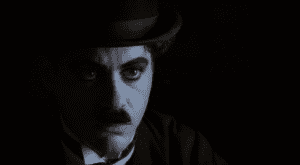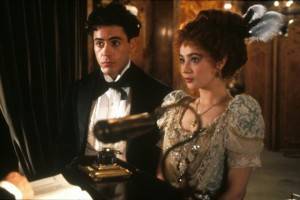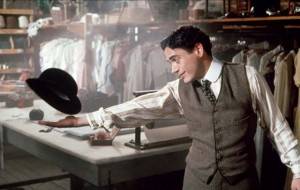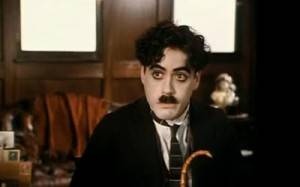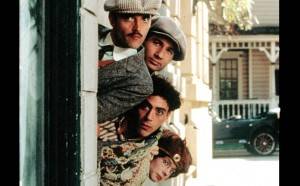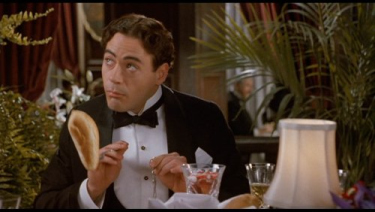Chaplin
Director Richard Attenborough is the first to admit that his epic biopic Chaplin was a difficult film to finance and consequently the producers made demands upon him which lead it to be not as “profound a picture” as he would have liked. Nethertheless its one massive saving grace is Robert Downey Jr.’s miraculous performance as Charlie Chaplin.
Although based on Chaplin’s 1964 autobiography and critic David Robinson’s book Chaplin: His Life and Art the screenplay, initially adapted by Attenborough’s long term business partner and publicist Diana Hawkins, was subject to many re-writes by luminaries such as Bryan Forbes (The Angry Silence), author William Boyd (The Blue Afternoon) and legendary screenwriter and script doctor, William Goldman (All the President’s Men).
Starting with Chaplin’s humble beginnings in Lambeth, London born to a Music Hall family his father was an alcoholic and disappeared very early on in his life leaving him with his singing mother, Hannah whose career was ended suddenly by a larynx condition resulting in Charlie taking to the stage in her stead. Hannah, played by Chaplin’s real life daughter Geraldine, suffered a mental breakdown and Charlie and his half-brother Sid (Paul Rhys) were taken to the workhouse.
Whilst honing his clowning skills in Vaudeville Charlie meets his first love, Hetty Kelly an Irish showgirl who he proposes to just before leaving for America with Fred Karno’s touring troupe along with Stan Laurel. Uncertain as to whether Charlie would return she refuses to marry him and dies later in the flu epidemic of 1918 which has a devastating effect on Chaplin and he remains obsessed with her memory, putting versions of her as the heroine in many of his films.
On arriving in the United States his reputation as a great physical comedian reaches Mack Sennett (Dan Aykroyd) whose Keystone Studios pioneer highly successful, silent slapstick films, he offers Chaplin a salary of $150 a week to come and work for him and within a month Charlie creates the character which goes on to make him the most famous man in the world and the first performer to earn $1,000,000 a year, ironically the impoverished Little Tramp.
It’s hard to imagine in our celebrity obsessed age, where people with seemingly very little talent can become incredibly well known overnight, just how meteoric Chaplin’s rise was and by co-founding United Artists with Douglas Fairbanks and Mary Pickford he not only had immense popularity he was also able to take total artistic control over his work and express views which led him to be perceived as an “outsider” and a threat to the American establishment, resulting in him being branded a Communist and forced into exile in Switzerland when he was refused re-entry in 1952 after a brief visit to England.
Political controversies aside Chaplin also had a reputation as a ladies man with a penchant for young girls, starting with his marriage to the child actress Mildred Harris who was only 16 at the time he had a string of apparently inappropriate relationships spawning many paternity cases and it wasn’t until his 50s that he would settle down with Oona, the 18 year old daughter of renowned playwright Eugene O’Neill, with whom he produced 8 children and remained married to until his death. To emphasise their special bond Oona is also played by Moira Kelly who is first seen playing his doomed childhood sweetheart Hetty.
The Blu-ray release of Chaplin could be better, suffice to say that the subtitle the “15th Anniversary Edition” pretty much confirms that this is merely an upscale of the DVD released in 2007; it’s a shame that Lionsgate couldn’t have waited another year to remaster a definitive 20th Anniversary Edition. Nonetheless the 1080p picture quality is a marked improvement especially in the colour palette with hitherto greyish reds appearing more vibrant, the DTS-HD 2.0 soundtrack is far superior particularly when showcasing the late John Barry’s original score. The extras are short and sweet, primarily it’s a candid interview with Richard Attenborough who is surprisingly self-effacing but honest about the film’s flaws.
I saw Chaplin in the cinema when it came out and despite the script issues, particularly the inclusion of the fictional character of George Hayden (Anthony Hopkins) to serve as Charlie’s biographer and act as a narrator allowing jumps between the key moments in what was a long and eventful life, you still leave the theatre utterly convinced by Robert Downey Jr.’s remarkable presence; his substance abuse and brushes with the law were highly publicised at the time and it’s truly incredible that he manages to immerse himself so totally in the role and pull off such a controlled and moving performance, confirming himself as one of the most versatile actors of his generation.

